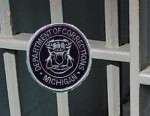The U.S. congressional race for Michigan’s 9th District is shaping up as a microcosm of the presidential election in Michigan: an evenly divided red-blue battleground whose recent voting patterns closely follow national trends. The contest has already seen angry confrontations between the candidates’ supporters, dueling videographers seeking damning footage, and now a candidate with the nickname “Dr. Death.”
The incumbent, U.S. Rep. Joe Knollenberg, R-Bloomfield Hills, is seeking his ninth term in the House. He faces a challenge from Gary Peters, a Democratic former state senator and lottery commissioner. Dr. Jack Kevorkian, famous for assisting more than 100 patients who wanted to commit suicide, announced in March his intention to run as an independent.
The district lies in Oakland County, a suburban area northwest of Detroit that also encompasses the city of Pontiac.
“Oakland County has been considered Republican, and most of the county commissioners are Republicans,” said Glenn Clark, chair of the Republican party in the 9th Congressional District. The decision by Democratic presidential candidates Sens. Hillary Clinton and Barack Obama not to campaign in Michigan for the primary, coupled with the decision by the Democratic National Committee not to seat Michigan’s presidential delegation in retaliation for moving up the presidential primary in violation of party rules, has further encouraged Knollenberg supporters.
“The district went for [Democratic presidential nominee Sen. John] Kerry in the last election,” counters Democratic activist Bruce Fealk.”It is definitely a swing district.”
Continued – Knollenberg, a U.S. Army veteran, is known as a Bush loyalist. He ran an insurance business before going into politics as chair of the Oakland County Republican Party, a position that he used to launch a successful run for Congress in 1992. Over the years in Washington he rose to become the ranking Republican on the House Appropriations Subcommittee on Transportation and Housing and Urban Development. He has had little trouble winning re-election against relatively unknown Democratic candidates. But 2006 proved different. That year he won by a narrower margin than ever before.
As a former small-business owner, Knollenberg is considered a moderate Republican with a strong pro-business bent but also a social conservative. That is one reason he endorsed former Massachusetts Gov. Mitt Romney for the GOP presidential nomination, but in February Knollenberg switched his endorsement to Sen. John McCain after Romney dropped out of the race.
His voting record has been closely aligned with the Bush administration. The League of Conservation Voters (LCV), the political voice for the environment, named Knollenberg to its 2008 “Dirty Dozen” list last October, based on his voting record on the environment. “Rep. Knollenberg has repeatedly voted for corporate polluters and against environmental protections, earning him a lifetime LCV score of only 7 percent,” according to a press release announcing the list.
One of Knollenberg’s biggest pet issues is the U.S. auto industry and specifically the issue of increasing CAFE — corporate average fuel economy standards.
In 2006 Knollenberg faced an unexpectedly strong challenge from Nancy Skinner, a relatively unknown liberal radio talk show host, and won by his smallest margin ever, 51-46 percent. The Democratic Congressional Campaign Committee took notice of that race and designated his seat as one of two the Democrats would concentrate on retaking in 2008. (The other is the 7th Congressional District, now held by conservative Tim Walberg.) Skinner was going to run again but deferred to the better-known Peters.
Peters, born and raised in Oakland County, was first elected to the Michigan Senate in 1994 and served two terms. In 2002 he ran for Michigan Attorney General and lost a close race to current AG Mike Cox by just 5,200 votes among more than 3 million votes cast. In 2003 Peters was appointed to run the Michigan State Lottery. Last year he became a professor of government at Central Michigan University.
Peters is not considered overly liberal, at least by some people, but he has performed well with the Democratic base in the past despite a solid business background. In the Senate, he was a strong supporter in the fight to protect Great Lakes water, earning him the Sierra Club’s Environmentalist of the Year award. He is also a strong supporter of law enforcement. The Michigan Fraternal Order of Police named him Public Servant of the Year, and the Michigan Deputy Sheriffs Association presented him with their Star Award.
Although he does not support the current direction of the war in Iraq, Peters is not considered an anti-war candidate.
“For too long, our representative in Washington has been a rubber stamp for the Bush administration’s failed policies in Iraq and failed policies on the economy,” Peters said in the press release announcing his candidacy. “The Knollenberg-Bush record includes outsourcing good jobs to other countries and a head-in-the-sand policy on Iraq.”
Democratic activist Fealk, who operates the blog “Vote no on Joe,” is a story himself. He has been a vocal anti-war critic, and he began following Knollenberg around at events, as well as appearing at parades, wearing a huge papier-m




